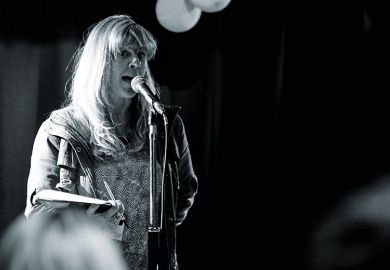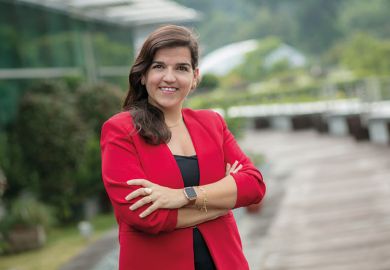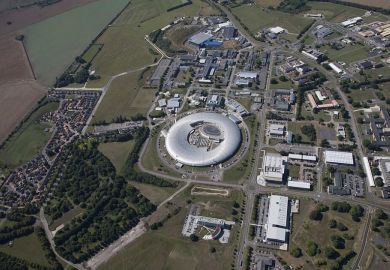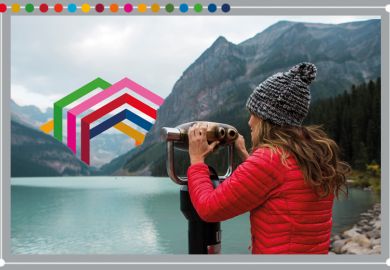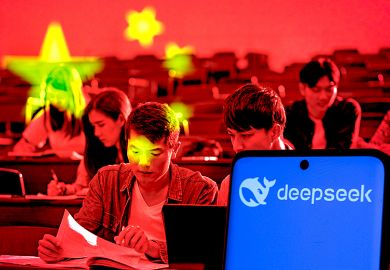Michelle Simmons is Scientia professor of quantum physics at the University of New South Wales. She is also director of the Australian Research Council Centre of Excellence for Quantum Computation and Communication Technology, leading a team of more than 200 researchers at eight universities who are developing technologies for quantum computing, information storage and communications. In January, she was named the 2018 Australian of the Year for her work and dedication to quantum information science.
Where and when were you born?
Bart’s Hospital, London, on 14 July 1967.
How has this shaped who you are?
On the positive side, I had a terrific multicultural background going to a south-east London comprehensive school. However, academically the school was a disaster. There were some good teachers, but there was little interest in academic work and it was more a case of survival.
You have just won the Australian of the Year award for your work in quantum information science. Why should Joe Bloggs care about your work?
Fundamentally, we are learning to understand how the world operates at the quantum level. This is interesting, but it’s also useful. If we can encode information in quantum states, it is anticipated that we will be able to get an exponential speed-up in computing power for a host of important optimisation problems. These include big problems in machine learning, logistical planning, pattern recognition, defence, financial analysis and in bioinformatics. Computing based on quantum principles will allow us to do calculations in real time that might otherwise take thousands of years.
What has been the most interesting discovery of your career?
The thing that I am most proud of is creating the new field of atomic electronics. Many people thought that it would be impossible to place an atom with precision in an electronic device and then measure it directly, let alone control the quantum spin of the electron on that atom to encode information. Along the way, we discovered unexpected behaviours. For instance, we’ve engineered silicon wires as thin as four atoms wide to behave like a metal such as copper, demonstrating that Ohm’s law survives to the atomic scale. Pretty much every device that we make is unique, and atom by atom we are building a picture of the way the world behaves at the quantum level.
You’re considered a role model for young scientists, particularly women. How can we get more women into physics?
I have considered this for many years. Fundamentally, it needs a cultural shift with parents and teachers encouraging girls to take maths and physics seriously at school and discovering for themselves how to enjoy it. There also needs to be an understanding that physics is a route to many career paths and that this presents a tremendous opportunity. Unlike a lot of vocational subjects, it doesn’t narrow your choices but expands them – you just need to have the confidence to chart your own path.
Have you had a eureka moment?
My first one was when I was working in Cambridge. I was looking to see if I could observe the signature of a new quantum state in a transistor. It took me a few months to design, fabricate and optimise the device. I was then measuring the device on a complex measurement system called a dilution refrigerator that allows you to measure at temperatures of near absolute zero, where the effect would be seen. At about 4am, I was watching real time as the data was coming out and saw the effect very clearly. I was so excited – but there was no one around (unusual even for Cambridge) and I remember walking home so I could go to sleep and thinking “life doesn’t get any better than this”.
What are the best and worst things about your job?
Best: the process of building something that has never been made before, pushing the boundaries of what is known, both technically in order to build and measure it, and theoretically in understanding it. Worst: the inherent dangers of groupthink and the ever-burgeoning bureaucracy.
What advice do you give to young academics?
Work hard and realise that your success is up to you.
What’s the biggest misconception about your field of study?
That women are no good at physics!
What do you do for fun?
I love to be with my family, this includes the occasional snuggle with my three children while hearing about their exploits, going for an early morning swim at the beach with them, exploring the Australian outback, and holding a family concert or family AFL [Australian Football League] or basketball match. I love to be outdoors.
If you weren’t an academic, what do you think you’d be doing?
If I’d lived in a different era and country I would have tried to become an astronaut. It has the combination of discovery, systematic rigour with high stakes, and technology that I love combined with fitness and resilience. However, if not this, then a professional basketball player, a pilot or a teacher.
If you were universities minister for a day, what policy would you introduce to the sector?
I would make sure that national competitive grants programmes are strong, objective and fund a range of fundamental research from individuals to large centres of excellence.
Tell us about someone you’ve always admired.
Elizabeth I. She survived in a very difficult time with all the odds against her.
Do you live by any motto or philosophy?
“Get the job done.” But, broadly speaking, I’ve worked to four mantras: do what’s hard; place high expectations upon yourself; take risks; and do something that matters.
sophie.inge@timeshighereducation.com
Appointments
Dame Anne Glover has joined the University of Strathclyde as special adviser to the principal. She was vice-principal of external affairs and dean for Europe at the University of Aberdeen, having served as chief scientific adviser for Scotland and the European Commission. Dame Anne, who will be in post from 1 March, will advise Sir Jim McDonald on internationalisation and research issues. “I hope to bring my broad national and international contacts here to look at what is happening at Strathclyde and…help to further enhance our mission of useful learning and translating world-class research into real-life impact,” said Dame Anne, president-elect of the Royal Society of Edinburgh.
Phillip Lindley has joined the School of the Arts, English and Drama at Loughborough University. Previously professor of art history at the University of Leicester, Professor Lindley will develop a multidisciplinary master’s on heritage and the historic environment at Loughborough, and will develop a research project focusing on the gardens and landscapes of 17th- and 18th-century country houses. “I’m very excited about the possibilities of interdisciplinary collaboration with new colleagues at Loughborough and I see enormous potential in the university’s distinguished traditions of applied scientific research and its innovative research and teaching in the arts and design,” he said.
Jeremy Newton has been appointed vice-principal and director of advancement at the Guildhall School of Music and Drama. Currently chief executive of the Children and the Arts charity, he will oversee two teams: development and alumni relations, and marketing and communications.
David Brown will take up the new role of director of executive education at Imperial College Business School. He was executive director of client solutions at London Business School.
Frédéric Mion has been appointed to a second term as president of Sciences Po, at the end of his first five-year term.
Register to continue
Why register?
- Registration is free and only takes a moment
- Once registered, you can read 3 articles a month
- Sign up for our newsletter
Subscribe
Or subscribe for unlimited access to:
- Unlimited access to news, views, insights & reviews
- Digital editions
- Digital access to THE’s university and college rankings analysis
Already registered or a current subscriber?

